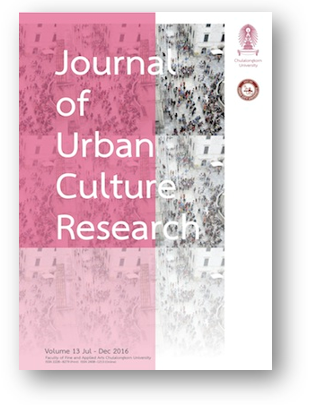Music Education Students’ Ways of Learning and Consumption of Cultures
DOI:
https://doi.org/10.14456/jucr.2016.16Keywords:
Music Education, ASEAN Economic Community, Music Education Students, TransculturationAbstract
The aims of this research were first to study cultures outside the ASEAN Economic Community – AEC that have entered Thai society and their affects on the original values of music education students during the 10-year period from 2006-15. Secondly, to study the ways of life and learning behaviors of the music education students at the higher education level caused by the consumption of cultures outside the AEC. The qualitative research method in collecting and analyzing data from documents and interviews was utilized. The research focused on a sample group of educators with direct experience in the with music education graduates and those with direct experience in hiring graduates of music education programs.
The research results showed that the influence of foreign cultures outside the AEC are composed of two factors: 1) The consumption of music and entertainment content and 2) the use of modern media and technology. These variables affect the ways of life and learning behaviors of the music education students throughout the 10-year period.
References
Chantavanich, Supang. Qualitative Research Methods. 23 ed. Bangkok: Chulalongkorn University Press, 2016.
Chantavanich, Supang, Samaang Hiranburana, and Kunwitra Pangkanon. Cultural Change and Moral Issues. Bangkok: Higher Education Long-Term Planning Project, Ministry of University Affairs, 2010.
Charoensook, Sugree. “Education of Music in Thailand after 2007.” Music Journal 16, no. 4 (December 2010): 10-16.
Chuppunnarat, Yoottana, Vitchatalum Laovanich, Khanobbhorn Sangwanich, and Malinee Achayuttakarn. “Conceptual Framework and Essential Skills of Arts, Music, and Dancing Arts Teachers in Managing Cultural Invasions from the Inside and Outside of the AEC: A Case Study of Thailand and the Lao People’s Democratic Republic.” News Release, 2016.
Khomwattana, Orawan, Wanchai Khomwattana, and Kattika Tangtanakanon. “Opinions on Music Education That Helps Support the Traditional Thai Music in Secondary School under the Central Department of General Education.” Bangkok: Research and Planning Division of the Office of the National Culture Division, 1980.
Kittiwarakul, Nantasit. “The Analysis of Creativity Characteristics of Progressive Rock Music Artists.” Thesis, Chulalongkorn University, 2001.
Lalitmongkol, Chompoonooch. “The Learning Processes of the Youth for Cultural Immunity Enhancement.” Thesis, Chulalongkorn University, 2013.
Laovanich, Vitchatalum. “Marginalization of Music as a Subject in Thai Basic Education Curriculum: An Archaeology of Knowledge Approach.” Fine Art International January-June (2013).
Mulsilp, Wuttichai, Kowit Wongsurawat, and Wongduan Narasat. “Cultural Relationships with Foreign Nations.” In Thai Junior Encyclopedia Project by Royal Command of H.M. the King 20. s.v. Bangkok: Thai Junior Encyclopedia Project By Royal Command of H.M. the King, 2007.
Paisoon, Pettabong. Socio-Cultural Change Among Tai Dam Lao Peoples Democratic Republic and Thailand : A Comparative Study. Loei Rajabhat University, 2010.
Prakru, Pariyatkittithamrong. “Change in Society and Culture.” In Buddhist Graduates Dissertations, Bangkok, 2013. 233-46.
Sakayapan, Saowapa. Adaptation and Change of the Tai Lue Food Culture in the Lanna Region. Bangkok: Department of Cultural Promotion Ministry of Culture, 2011.
Sojeiya, Atchara. “Youth Culture in the Modern Thai Songs’ Music Videos.” Thesis, Mahidol University, 2004.
Srisukong, Masupa. “Development of Professional Education in Thai Classical Music in the Rattanakosin Period.” Thesis, Chulalongkorn University, 1998.
Suksom, Usuma. “Creation of Youth Identity through Clothes and Fashion: A Case Study of Siam Square.” Thesis, Chulalongkorn University, 2007.
Sutthachit, Narutt. Music Education, Principles, and Essences. Bangkok: Chulalongkorn University Press, 2012.
Tananuprawat, Patsaran. “Communication for the Formation and Maintenance of the Identity of Hardcore Music Fans in Thailand “, Chulalongkorn University, 2009.
Tapsscott, Don. The Digital Economy. Translated by Ponsak Aurajchatchairatna. Mc Graw Hill Education, 2016.
Thara-rattanakul, Thitima. “Group Communication Process and Identity of “Indie Music.” Chulalongkorn University, 2005.
Thongsuk, Wachira. “Origin, Development and Diffusion of Ska-Reggae Culture in Thailand.” Chulalongkorn University, 2009.
Downloads
Published
How to Cite
Issue
Section
License
Authors authorize the JUCR to publish their materials both in print and online while retaining their full individual copyright. The copyright of JUCR volumes is retained by Chulalongkorn University.
The views and opinions expressed herein are those of the individual author(s) and do not necessarily reflect the policies or opinions of the Journal (JUCR), it editors and staff, Chulalongkorn University, or Osaka Metropolitan University.








